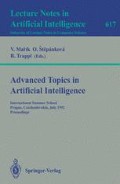Abstract
Inductive Logic Programming (ILP) is concerned with construction of logic programs from examples. It shares many concerns of Machine Learning (ML), but is committed to logic. As logic can help to provide a basis for elaborating such a methodology for learning, the area of ILP has attracted a wide attention of many researchers. This paper reviews some of the methods and techniques in ML that exploit logic.
Preview
Unable to display preview. Download preview PDF.
References
Banerji R.B. (1988): Learning Theories in a Subset of Polyadic Logic, in Proceedings of the First Workshop on Computational Learning Theory (COLT), 1988.
Bergadano F, Giordana A. (1988): A Knowledge Intensive Approach to Concept Induction, in Proceedings of 5th International Conference on Machine Learning, Ann Harbour.
Brazdil P. (1981): Model for Error Detection and Correction, Ph.D. Thesis, University of Edinburgh.
Brazdil P. (1984): Use of Derivation Trees in Discrimination, presented at ECAI-84, Pisa, Italy.
Brazdil P. (1989): Transfer of Knowledge between Systems: Use of Meta-Knowledge in Debugging, in Y. Kodratoff and A. Hutchinson (eds.), Machine and Human Learning. Michael Horwood, London.
Brazdil P. and Torgo L. (1990): Knowledge Acquisition via Knowledge Integration, in B. Wielinga (ed.), Current Trends in Artificial Intelligence. IOS Press, Amsterdam.
Brazdil P. (1991): Learning in Multi-Agent Environments, in Proceedings of the Second Conference on Algorithmic Learning Theory (ALT-91), pp. 15–29, Tokyo. Ohmsha.
Burstall R. and Darlington J. (1977): Transformations for Developing Recursive Programs, J. ACM, Vol. 24, No.1, pp. 44–67.
Console L. and Torasso P. (1990): Integrating Models of the Correct Behaviour into Abductive Diagnosis, in L. Aiello (ed.), Proceedings of 9th European Conference on Artificial Intelligence (ECAI-90), Stockholm. Pitman.
Dahl O., J.W. Dijkstra and C.A. Hoare (1972): Structured Programming. Academic Press.
Davies T.R. and Russell S. (1987): A Logical Approach to Reasoning by Analogy, in Proceedings of IJCAI-87, Milan. Morgan Kaufmann.
Genesereth M.R.and Nilsson N.J.(1987): Logical Foundations of Artificial Intelligence, Morgan Kaufmann.
Hogger C.J. (1990): Essentials of Logic Programming, Oxford University Press.
Idestam-Almquist P.(1992): A General Bias for Learning Missing Clauses by Inverse Resolution, to appear in Proceedings of FGCS '92, Tokyo. Ohmsha Press.
Kisirikul B., Numao M. and Shimura M. (1992): Discrimination-Based Induction of Logic Programs, Dept. of Computer Science, Tokyo Institute of Technology. Submitted to 9th International Conference on Machine Learning, Aberdeen, Scotland.
Ling C. (1992): The Completeness of Inductive Learning Based on Inverse Resolution, submitted to 9th International Conference on Machine Learning, Aberdeen, Scotland.
Lloyd J.W. (1987): Foundations of Logic Programming (2nd ed.), Berlin, Springer-Verlag.
Michalski R., Mozetic I., Hong J. and Lavrac N. (1986): The Multi-purpose Incremental System AQ15 and its Testing Application to Three Medical Domains, in Proceedings of AAAI-86, pp. 1041–1045.
Muggleton S. (1991): Inductive Logic Programming, New Generation Computing, Vol. 8, pp. 295–318.
Muggleton S. and Buntine W. (1988): Machine Invention of First-order Predicates by Inverting Resolution, in Fifth International Conference on Machine Learning, pp. 339–352, Ann Harbour, Michigan. Morgan Kaufmann.
Muggleton S. and Feng C. (1990): Efficient Induction of Logic Programs, in Proceedings of the First Conference on Algorithmic Learning Theory (ALT-91), pp. 368–381, Tokyo. Ohmsha.
Quinlan R. (1986): Induction of Decision Trees, Machine Learning, Vol. 5, pp. 239–236.
Quinlan R.(1990): Learning Logical Definitions from Relations, Machine Learning, 5, pp. 239–266, Kluwer.
Rouveirol C. and Puget J.F.(1990): Beyond Inversion of Resolution, in Proceedings of Seventh International Conference on Machine Learning, pp. 122–130, Austin, Texas. Morgan Kaufmann.
Russell S. and Grosof B. (1991): A Sketch of Autonomous Learning using Declarative Bias, in P. Brazdil and K.Konolige (eds.), Machine Learning, Meta-Reasoning and Logics. Kluwer.
Tangkitvanich S. and M. Shimura (1991): Recovery from Multiple Faults in Relational Theory, Proceedings of the Second Conference on Algorithmic Learning Theory (ALT-91), pp. 15–29, Tokyo. Ohmsha.
Wirth R. (1988): Learning by Failure to Prove, in D.Sleeman (ed.), Proceedings of EWSL-88, pp. 237–251. Pitman.
Wirth R. (1989): Completing Logic Programs by Inverse Resolution, in K.Morik (ed.), Proceedings of EWSL-89, pp. 239–250. Pitman.
Wirth R. and O'Rorke P. (1991): Constraints on Predicate Invention, in Proceedings of Eighth International Conference on Machine Learning, pp. 457–461, San Mateo, CA. Morgan Kaufmann.
Shapiro E. (1983): Algorithmic Program Debugging. MIT Press, Cambridge, Mass.
Author information
Authors and Affiliations
Editor information
Rights and permissions
Copyright information
© 1992 Springer-Verlag Berlin Heidelberg
About this paper
Cite this paper
Brazdil, P.B. (1992). Approaches to inductive logic programming. In: Mřrík, V., Štěpánková, O., Trappl, R. (eds) Advanced Topics in Artificial Intelligence. Lecture Notes in Computer Science, vol 617. Springer, Berlin, Heidelberg. https://doi.org/10.1007/3-540-55681-8_34
Download citation
DOI: https://doi.org/10.1007/3-540-55681-8_34
Published:
Publisher Name: Springer, Berlin, Heidelberg
Print ISBN: 978-3-540-55681-7
Online ISBN: 978-3-540-47271-1
eBook Packages: Springer Book Archive

